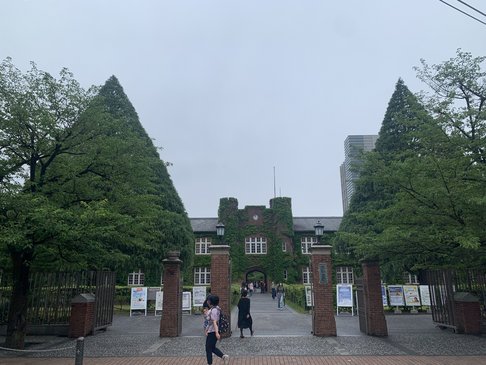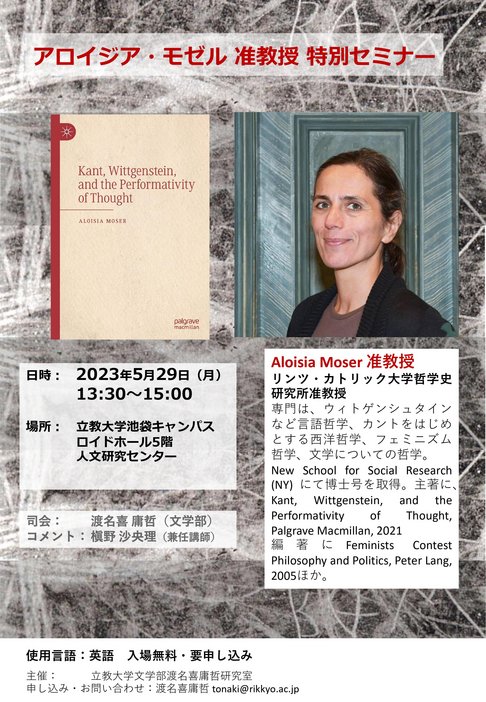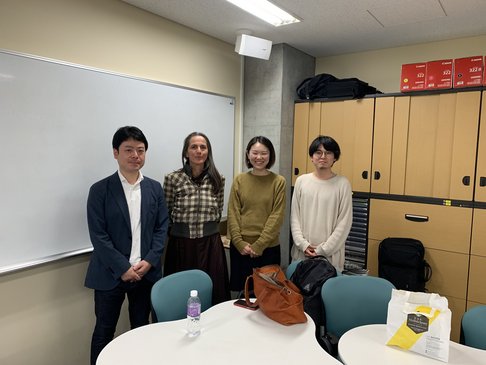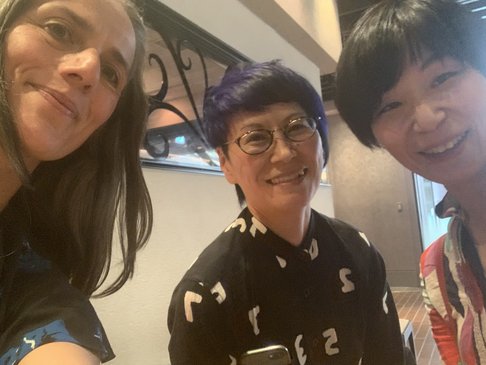Aloisia Moser an der Rikkyo University, Tokyo, Japan

This Erasmus + Job Shadowing and Mobility Visit was made possible by the diligent work of Saori Makino, Wittgenstein Scholar in Japan, who earned her Ph.D. at Chiba University and teaches at Rikkyo University. I know her through my work on Wittgenstein and have met her before at the Austrian Wittgenstein Symposium in Kirchberg, Lower Austria. Through her legacy, Professor Yotetsu Tonaki was made aware of the possibility to create an Erasmus + Cooperation between the Catholic Private University in Linz and Rikkyo University in Tokyo.
It is not so easy to make the philosophical cooperation work, since most universities in Japan do not have a designated philosophy department, but the faculty is distributed among different departments, of the university, e.g., a legal philosopher in the law Department, a Kant Scholar in the German department etc. or as in the case of Professor Tonaki in the Department of letters.
Professor Tonaki already knew our colleague Christian Rößner, whom he had met at a conference in Kyoto in 2019, so the mobility was made possible, and another professor from Christianity Studies was invited to the table.
The weekend before the mobility started, I got on a plane from Vienna to Tokyo and tried to adjust as much as I could. Since Tokyo is seven hours ahead of us, meetings in the morning would be brutal, so we scheduled our first meeting for lunch on Monday the 29th. Saori Makino met me at one of the biggest subway stations in Tokyo Ikkebukoro, where the university is located. She told me exactly which exit to take, so that we could walk to the university in the most efficient way. It was amazing to see how a city of 40 million people can function so flawlessly. The rainy season starts in June, so there was a lot of rain, but luckily the sun would break through at times.
Saori Makino showed me around the campus and the library where we met with Prof. Yotetsu Tonaki and Professor Shuichi Hasegawa who is Associate Professor of the Hebrew Bible and Ancient Near East in the Department of Christian Studies and had lunch.
This lunch meeting took place in the Faculty Dining Room of the University, where delicious fresh and seasonal Japanese food was served. We began to talk about our different departments and roles, and about exchange opportunities. I explained the concept of the Erasmus + Cooperation, that it would open a channel - like the phatic function of language - between our two institutions and that faculty, staff and students could benefit from visiting each other. That the grant money would be applied for from our (the European) side, but that visitors from Japan would be able to travel on that funding.
Prof. Hasegawa talked about his work in Hebrew studies, translations (he is fluent in German) and his projects which include anthropological studies and a current excavation in Israel. He immediately recommended that our students could come to the excavation site. Then we planned my talk for Prof. Tonaki’s seminar, at which I was going to talk about “How to Become a Feminist Philosopher.” I talked about Wittgenstein and atmospheres to students working on Wittgenstein, but also Heidegger and other Western philosophers. I stressed the importance of going abroad, seeing different universities, and working with different professors, using my own example of going first to Berlin and then to New York to do my Ph.D.
After the talk we went to a place next to Ikkebukoro Station and tried some delicious Japanese draft beers. Later in the evening over dinner in a Yakitori restaurant the graduate students showed me how to drink Shochu and Hoppy, the first is a cheap Japanese schnapps, the latter a nonalcoholic drink that is used as a mixer.
During my stay the plan was made to continue working on the cooperation, so that Saori Makino and Prof. Tonaki could be the first to come to Linz next year.
On Friday I took Shinkansen to Kyoto to meet a Japanese friend and colleague, Yayo Okano, who had given a paper at a conference I organized in New York in 2003. It turned out that she had become not only one of Japan’s most famous feminists, but also a dean at Doshisha University in Kyoto.
We were lucky to catch up after such a long time and I learned a lot about her work on care ethics, and the struggle to get the problem of "comfort women" - women forced to prostitution by the Japanese Army in occupied territories like China and Korea in the 1930ies and 40ies - recognized in Japan. She also works with her partner Satomi Maruyama, who is a professor of sociology, on women and poverty. We started to make plans for a future cooperation between Doshisha University and the KU Linz.
Aloisia Moser, Juli 2023



